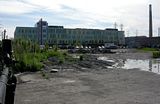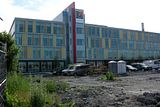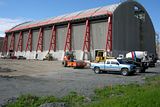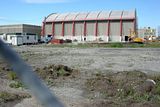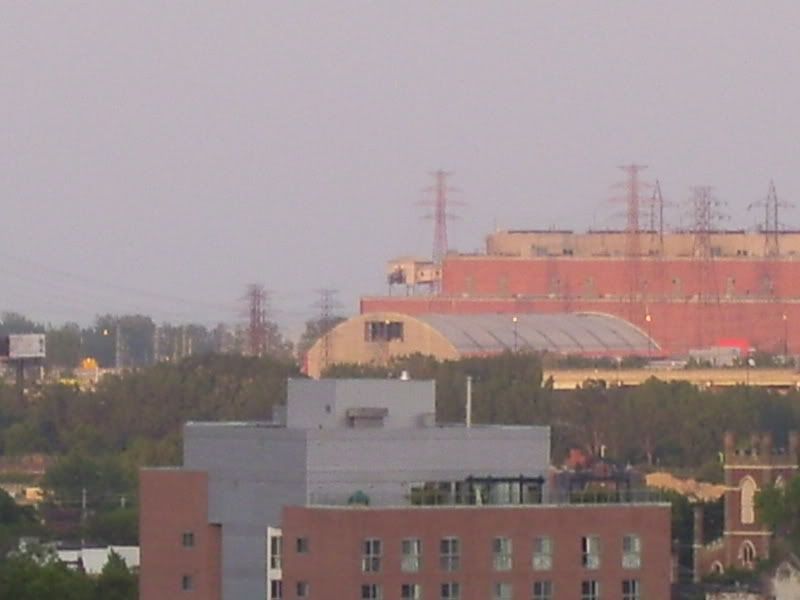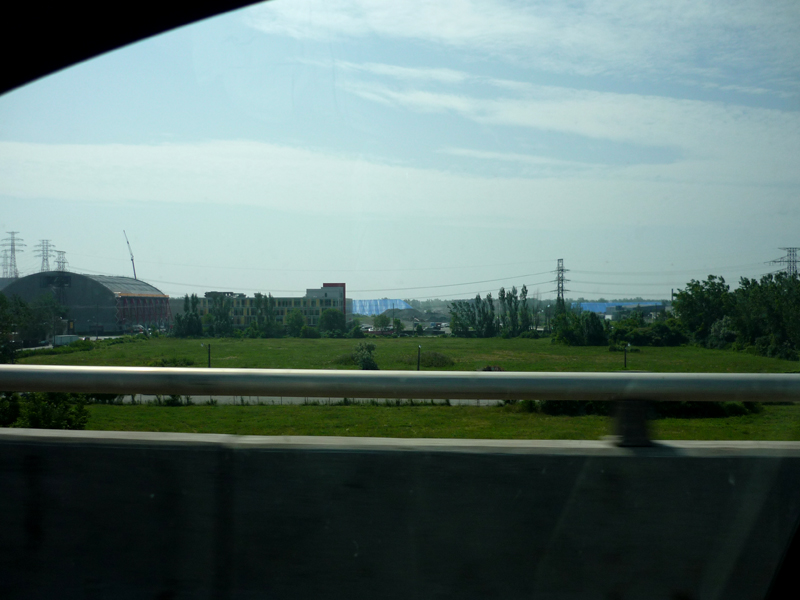Globe: Backroom player is ready for its close-up
Backroom player is ready for its close-up
ELANA SAFRONSKY
Globe and Mail Update
August 18, 2008 at 6:00 AM EDT
It could have been yet another condominium on Toronto's waterfront. Instead, a former brownfield site is the home for what observers hope will rejuvenate the city's film industry and restore its claim as “Hollywood North.â€
A project known as Filmport has its premiere Wednesday with the official launch of the first phase of what ultimately will become a $700-million venue for film production.
Already, a cavernous, hangar-shaped soundstage – at 49,500 square feet, it is said to be the largest of its kind in North America – has become a landmark in an otherwise dreary stretch of former industrial and port property on Toronto's eastern waterfront.
Filmport was created to provide a centralized facility for movie makers, sparing them the need to conduct shoots in abandoned warehouses.
But it's also another feather in the cap for Toronto Economic Development Corp. (TEDCO), which is leasing the 20 acres to the development's principals, Rose Corp. (owner of Toronto Film Studios) producer Comweb Group Inc., and Ken Ferguson, president of Filmport Inc.
The 550,000 square feet of film and television production space planned for the site can be traced to a study TEDCO conducted in 2002, examining why Toronto was losing big productions to other Canadian cities, such as Vancouver and Montreal, Mr. Ferguson says.
“Studios are very expensive to build and a lot of other cities built their soundstages with government assistance. Ontario for years had taken the position that they were not going to throw public money at a private business, and without help it's very difficult for anybody to pull off,†he says.
So, like the cavalry charging in to save the day, TEDCO acquired waterfront property from Imperial Oil Ltd. with an eye to remediation, and to designate it for the construction of the facilities.
“We knew the film industry was hitting a glass ceiling,†says Jeff Steiner, TEDCO's chief executive officer. “And, while it would have been much more profitable, and more fun in some ways, to turn it into a condo village – because it's on the water – we put on our economic development hat and decided that the higher priority for the city was to make land available for the growth in infrastructure for the film industry.â€
TEDCO's role also reflects an odd hybrid of purposes: Pursuing public policy while dabbling in the private world of commercial real estate. From its inception in 1986, TEDCO's mandate has been to “pursue industrial and economic development, and to attract and retain jobs in the City of Toronto.†To this end, it can buy, sell, lease and otherwise deal in real property, also the main source of its revenue.
TEDCO, which acts at arm's length from its sole shareholder, the City of Toronto, has become a significant player in the city's real estate development – indeed, in the case of the port lands, it has ventured where other developers may have been reluctant to tread, one observer suggests.
After the Toronto Harbour Commission transferred more than 400 acres of mostly contaminated port land to TEDCO in the early nineties, real estate development became its core function.
“After we received all that land, [TEDCO] did some projects in the late nineties in and around brownfields that, while they weren't enormous, were in a way ground breaking because they were examples of brownfields actually [being] cleaned up,†Mr. Steiner says.
Today, TEDCO owns more than 500 acres of land across the Greater Toronto Area, has more than one million square feet of proposed developments and is involved in at least 14 projects. Since 1992, it has restored more than 120 acres of brownfield land to productive use, Filmport being the latest example.
It is also an example of how a city's former economic development commission has used more aggressive tactics – expanding its role from mainly landowner to strategic investor and development partner – in pursuing new economies.
Professor Pierrre Filion, co-author of Canadian Cities in Transition: The Twenty-first Century, who teaches at the University of Waterloo's School of Planning, says this is most evident in the port lands.
“Before the city of Toronto amalgamated into the Greater Toronto Area, the inner city was losing manufacturing jobs, and TEDCO wanted them back,†Prof. Filion says, “But now it's very hard to attract industry to those areas. The port's essential functions are few, and Toronto is not a major port city.
“There's not much incentive for [companies] to locate close to the harbour – industry goes to the suburbs. The vision for the waterfront has changed and TEDCO's tactics in developing those lands have had to adjust accordingly.â€
Besides Filmport, another major TEDCO development in the port lands includes the Toronto headquarters and broadcast centre for Corus Entertainment Inc., a $147-million investment that is expected to bring 1,300 workers to Toronto's waterfront area by 2009. Elsewhere in the city, TEDCO is in predevelopment for a 14-acre office complex to be known as Downsview Corporate Centre near the Downsview airport.
“What they're doing is a little bit of city building, which is not necessarily a bad thing,†says Michael Brooks, chief executive officer of the Real Property Association of Canada. “Sometimes, [TEDCO] can accomplish things that a private developer can't, particularly when it comes to land assembly, brownfields and dealing with a larger area … helping to revitalize an area that may otherwise have been pretty stagnant.â€
In the case of Filmport, Mr. Steiner certainly makes a case for TEDCO's hand in city building. Filmport's website refers to the development as a “convergence district†for the film and media community and the company is planning its own foray into commercial real estate with plans for office and industrial space there.
“Filmport will be a hub of employment and dynamism that will make the area interesting. Yes, some people at city council thought the land would be better used as condos, but there are other lands in the surrounding area that will be available for residential development, and of course we want mixed use,†he says.
Thanks to TEDCO's initiative, Mr. Steiner suggests, the transformation around Toronto's downtown coe has already begun. “The port lands were off-off-core, now they're just off-core.â€
